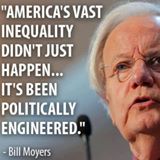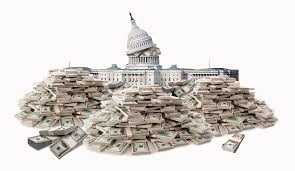This article was inspired by the recent
critical assessment of American economic policy embodied in two writings by David
Stockman. As readers will recall, Stockman was Director of the Office of
Management and Budget under Ronald Reagan and the ultimately disillusioned
chief architect of Reagan's supply-side, or "trickle-down," economic policies. His
assessment of what's wrong now with American economic policy is fully developed
in his 2013 New York Times bestseller
The Great Deformation: The Corruption of
Capitalism in America, and, in
more succinct form, in a companion New
York Times opinion piece of March 31, 2013. That is entitled "State-Wrecked:
The Corruption of Capitalism in America."
As reflected in its title, Stockman makes the case in his NYT op-ed that the U.S. federal government and its central-bank sidekick have corrupted American capitalism by enabling crony capitalism. It is the State, Stockman makes clear, that is responsible for the corruption of American capitalism. It is not the other way around.
What Stockman doesn't tell us, however, is why the government is willing to enable crony capitalism. He doesn't address the root-cause behind the motivation.
The question we have to ask ourselves is this: Why, after four decades (the 1930s to the 1960s) in which government policies resulted in a narrowing of the wealth gap, did U.S. officeholders from both parties enact policies over the following four decades (the 1970s to the 2000s) that had the effect of widening the wealth gap? Clearly, there was no ground-swell among U.S. voters to get policy makers to make such a U-Turn. The only explanation for such a sea change in policy is that it was the result of a planned and orchestrated effort by powerful people and organizations.
The ground-swell for the U-Turn came not from the people, but from corporate America. It was orchestrated by the U.S. Chamber of Commerce, following prompting by a future U.S. Supreme Court Justice.
The Lewis Powell Memo and Its Effects in Widening the Income Gap
On August 23, 1971, Lewis F. Powell, Jr. drafted a confidential memorandum to the U.S. Chamber of Commerce. It was entitled: "Attack on American Free Enterprise System." The Powell Memo pointed out that "the most disquieting voices joining the chorus of criticism [of American free enterprise] come from perfectly respectable elements of society: from the college campus, the pulpit, the media, the intellectual and literary journals, the arts and sciences, and from politicians."
By the end of 1973, a U.S. Chamber of Commerce task force, which included executives from corporate giants ranging from G.E. to General Motors, had translated the Powell Memo into an action plan. It proposed actions predominantly in the fields of education, communications, politics, and the judiciary. The full breadth and depth of this action plan can be found by searching: Business Response to the Powell Memorandum-Anderson.pdf.
Defenders of the current income/wealth gap in America like to claim that it results naturally from the dynamics of the free enterprise system. They fail to mention, however, the effect the Powell memo has had on that system since 1973. The Powell memo can in fact be viewed as the smoking-gun that triggered the present historic gaps in U.S. income and wealth.
Some may view Lewis F. Powell, Jr. as America's 20th - century Paul Revere. It was Powell who warned the country's financial aristocracy that their security, standard of living, and quality of life were in jeopardy, unless actions were taken to defend and preserve them. Ultimately, the actions that were taken not only defended and preserved the interests of the rich, but greatly enhanced them. Over the last four decades, the income and wealth gaps in the U.S. have widened greatly at the expense of the 99%.
The Companion Democracy Gap and the Supreme Court
An issue that has received much less attention than the widening income and wealth gaps, but should be even more troubling to the 99%, is the companion "democracy gap." The actions taken by America's financial aristocracy have not only reduced the economic power of the 99% on a relative basis, but reduced their political power on an absolute basis. Voters among the 99% choose people to represent them, based on their expectations of how the candidates will respond to their interests once in office. Unfortunately, those expectations are systematically undermined once the candidates take power.
Campaign promises to pursue policies that could narrow the income/wealth gap are soon swept under the rug. Why else would the slogan "It's the economy, stupid!" still be an election-year mantra two decades after its first use? To be blunt, it's because our political leaders once in office are less responsive to the 99% on fundamental economic issues than they are to the 1%. How else could the 1% get a return on their campaign contributions?
The Democracy Gap can be best defined as the gap between relevant election issues and relevant policy issues. This gap should be the most troubling to the 99%, because, as long as America's financial aristocracy determines which economic issues warrant action, there can be no end in sight for the ever-widening income and wealth gaps. The same scenario plays out with respect to America's cumulative trade deficit, which, not coincidently, has also been increasing for almost four decades.
Since 1999, the Supreme Court of the United States (SCOTUS) has, on balance, been the best friend in government to America's financial aristocracy. Currently, the SCOTUS is the only branch of our government whose decisions American voters have no direct power to influence. This can be viewed as a major democracy deficit, when it is considered that, since the year 2000, Supreme Court rulings on issues most vital to the 99% have come on 5-to-4 decisions.
If American free enterprise was in fact under attack in 1971, it is obvious that it has now swung to the opposite extreme. It is our democracy that is now under attack. In a late May/early June 2012 CBS News/New York Times poll, 76 percent of respondents said that the Supreme Court decides cases based on personal and political views, not legal analysis.
(Note: You can view every article as one long page if you sign up as an Advocate Member, or higher).






